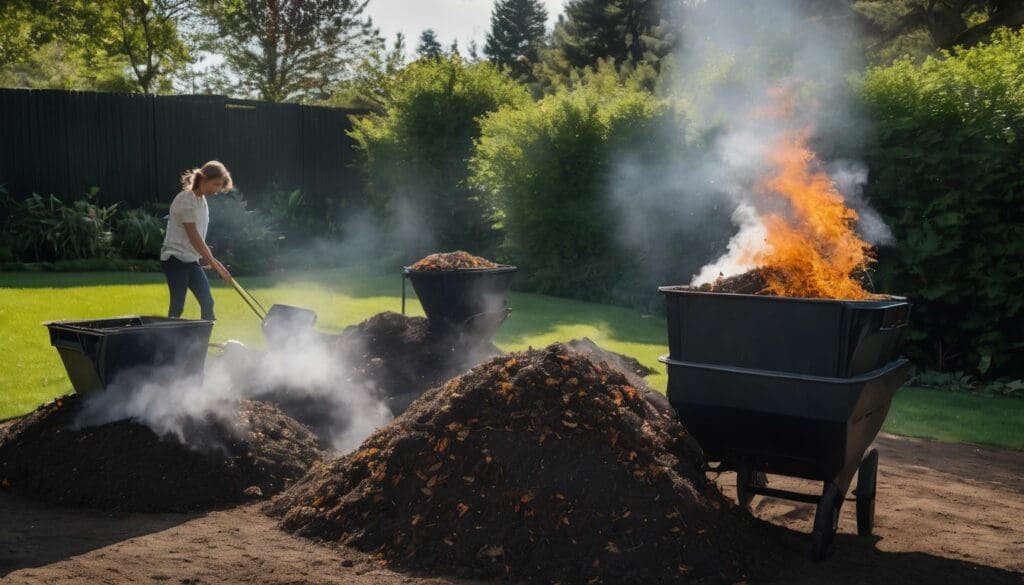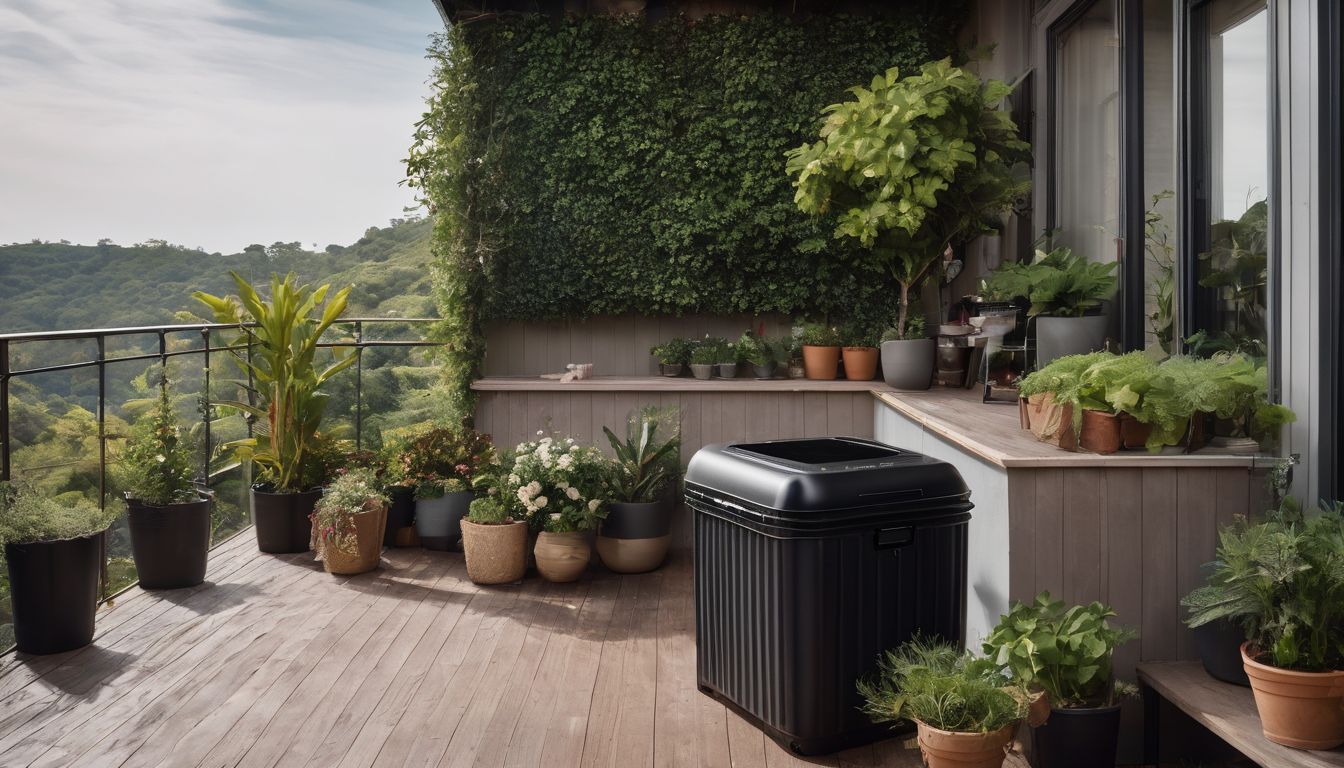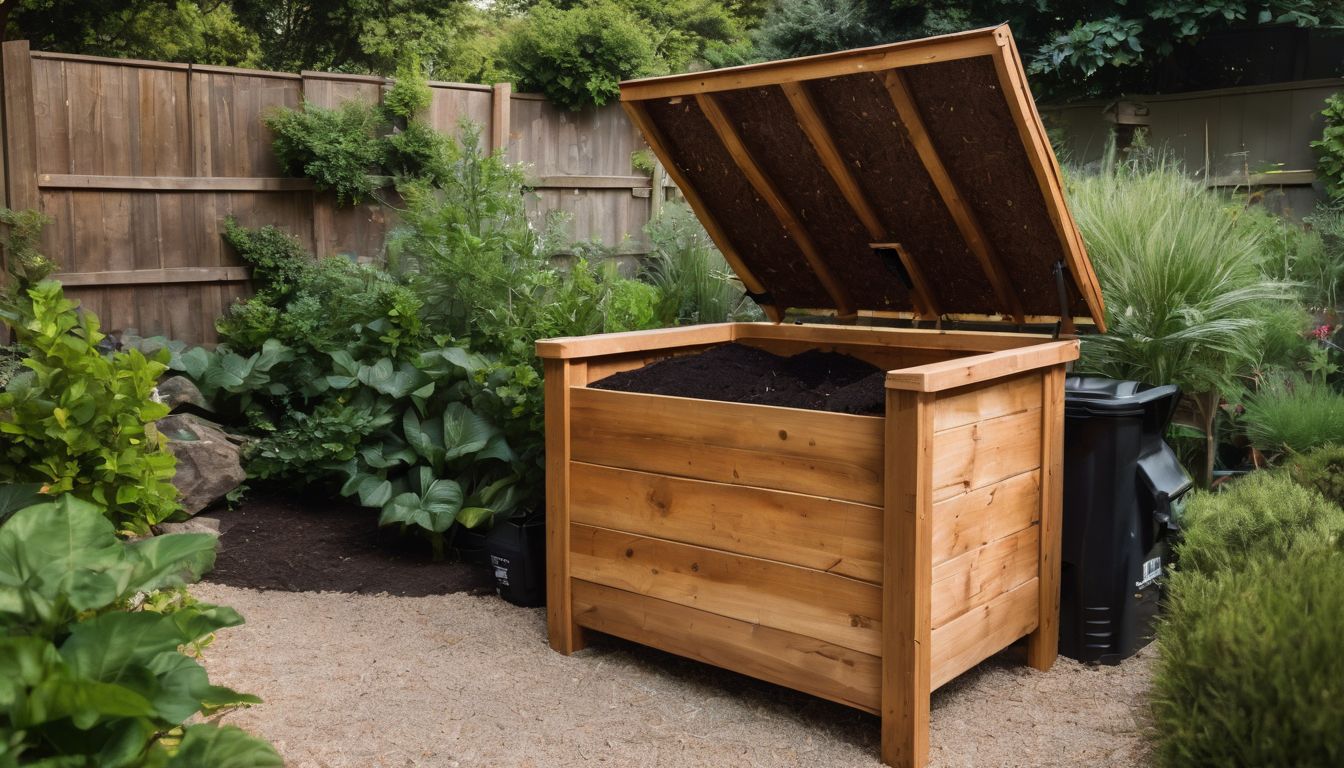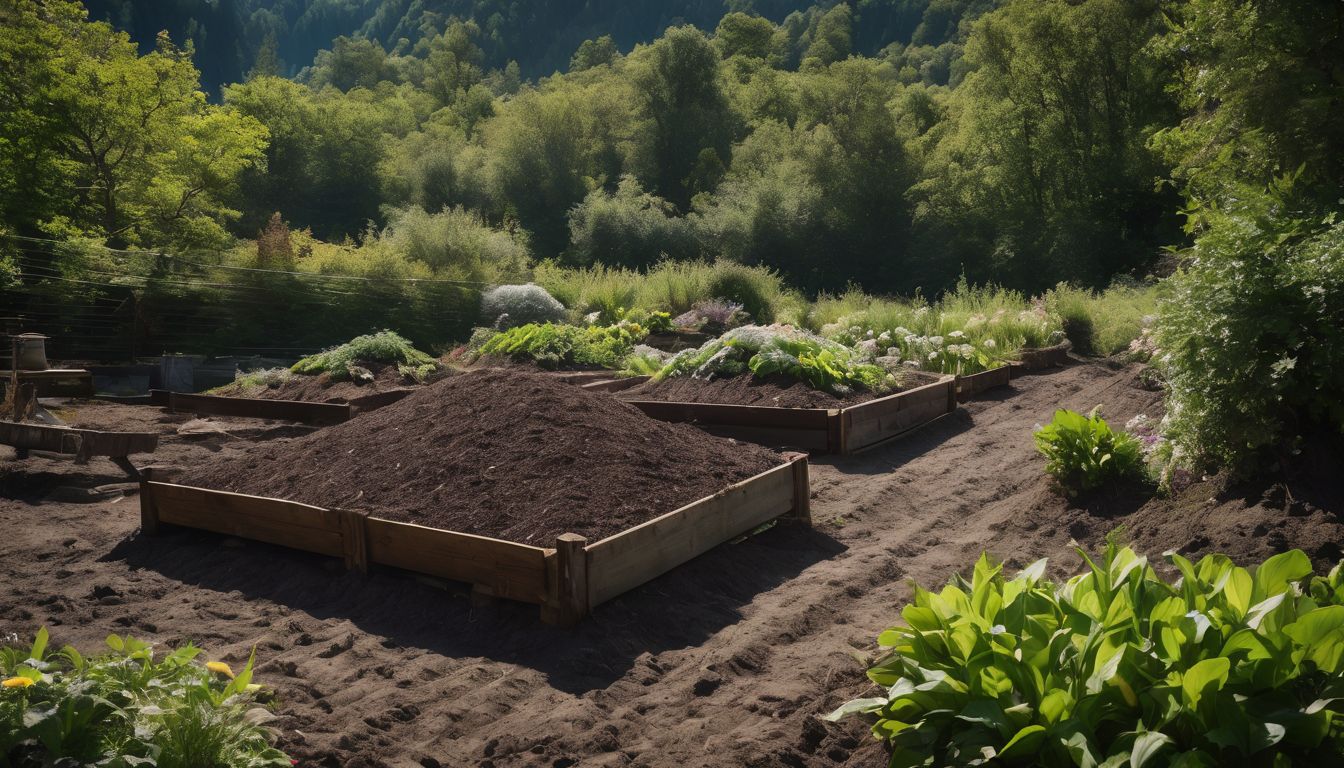Are you tired of waiting months for your compost to be garden-ready? A well-managed compost pile can transform into rich soil in as little as four weeks. This post will guide you through simple strategies to accelerate the composting process, getting your garden the nutrients it needs sooner.
Let’s dig in and get composting quicker!
Key Takeaways
- Balance brown and green materials in your compost heap to maintain the ideal carbon-to-nitrogen ratio, encouraging quicker decomposition.
- Regularly turning the compost heap improves aeration and speeds up the breakdown of organic matter, resulting in faster production of nutrient-rich humus.
- Adding smaller pieces of organic waste to your compost increases surface area for microbes to work on, which can significantly expedite the composting process.
- Maintain optimal moisture levels within the compost; it should feel damp like a wrung-out sponge to encourage microbial activity without becoming waterlogged.
- Utilise tools such as insulated bins or tumbling composters, and add activators like biochar or nitrogen-rich material to fast-track decomposition.
Understanding Composting
Composting is the natural process of breaking down organic materials into nutrient-rich soil. It involves the activity of microorganisms that thrive in oxygen-rich (aerobic) conditions, with carbon and nitrogen as their food source.
The benefits of composting include reducing waste, enriching soil, and promoting a healthier environment for plants to grow.
The process of decomposition
In the heart of composting lies decomposition, nature’s way of recycling organic material. Microorganisms, including bacteria and fungi, play a vital role here, breaking down leaves, twigs, fruit skins and more into simpler substances.
These tiny powerhouses work tirelessly to transform garden trimmings and kitchen scraps into rich humus – the dark, nutrient-dense portion of soil that plants thrive in.
Aerobic decomposition is at the centre of creating great compost. It requires oxygen to fuel the microorganisms as they munch through your pile of organic waste. Ensuring plenty of air flow prevents foul odours by keeping this process aerobic rather than anaerobic.
To speed up decomposition, you must cater to these microscopic decomposers’ needs: balance carbon-rich browns like dried leaves with nitrogen-heavy greens such as vegetable scraps; maintain adequate moisture without soaking through; and keep it all loosely piled to allow organisms easy access to their next meal.
Benefits of composting
Composting enriches garden soil, reducing the need for chemical fertilisers. Organic waste is diverted from landfills, cutting methane emissions and lessening landfill congestion. Composting fosters healthy plant growth, decreases water runoff and erosion, preventing pollution of nearby bodies of water.
By composting at home or in the garden, individuals can create a valuable resource and contribute to a cleaner environment. Additionally, using homemade compost reduces the reliance on store-bought fertilisers and helps promote sustainable living practices.
Factors Affecting Composting Speed
The speed of composting depends on the proper ratio of brown and green materials, as well as factors such as aeration, moisture levels, and temperature. Shredding materials can also help to speed up the decomposition process.
Proper ratio of brown materials to green materials
To speed up the composting process, maintain a balanced ratio of brown materials such as leaves and twigs to green materials like kitchen scraps and grass clippings. This balance ensures that there is enough carbon for energy and nitrogen for protein in the decomposition process, which stimulates microbial activity and accelerates organic matter breakdown.
Maintaining an appropriate mix of brown and green materials is crucial in improving composting efficiency. It promotes faster decomposition, enhances organic waste breakdown, increases decomposition rate while boosting composting effectiveness.
Balancing these ratios fosters quicker composting methods, helping to expedite the overall composting process significantly.
Shredding materials
To enhance the decomposition process, shredding materials into smaller pieces will quicken the breakdown of organic matter. By reducing the size of items such as leaves, twigs, and other garden waste, you create more surface area for microorganisms to work on, thereby accelerating composting.
Smaller materials also integrate better with other compost ingredients, allowing for improved aeration and moisture distribution throughout the pile. This ultimately improves compost efficiency and aids in creating high-quality compost for your gardening needs.
Shredding materials not only expedites organic waste breakdown but also ensures that all components decompose at a faster rate. Increased surface area provided by shredded material facilitates microbial activity in breaking down the organic matter effectively without any delay or interruption.
Aeration
To accelerate composting, ensure the pile is well-aerated by turning it regularly. This introduces oxygen which supports the growth of helpful bacteria and speeds up decomposition.
Additionally, creating free air space within the pile will enhance organic matter breakdown efficiency.
Adding biochar also helps boost aeration in the compost pile. This increases airflow and acts as a habitat for beneficial microorganisms, accelerating the composting process further.
Moisture levels
To enhance the composting process, maintain appropriate moisture levels. Ensure that the compost pile is as damp as a wrung-out sponge. Regularly check and adjust moisture by sprinkling water or adding dry materials if the pile becomes too wet.
Excessive moisture slows down decomposition, while insufficient moisture hinders microbial activity.
Inadequate moisture can lead to a lack of oxygen in the pile, which can cause anaerobic conditions and result in unpleasant odors. To avoid this, monitor your compost heap regularly to ensure it remains moist but not waterlogged throughout the entire breakdown process.
Temperature
Maintaining the right temperature is crucial for accelerating the composting process. The ideal range of 135 to 160 degrees Fahrenheit promotes rapid decomposition and kills weed seeds and pathogens, ensuring high-quality compost.
Consistent monitoring of temperature levels within the compost pile is essential for achieving fast breakdown rates. This can be achieved by using a thermometer inserted into the pile or simply by feeling if it’s warm to the touch.
Regularly adding nitrogen-rich materials as well as turning and aerating the pile helps regulate heat, optimising conditions for efficient composting.
Techniques to Speed Up Composting
Layering twigs and sticks, adding old compost or soil, using a compost duvet or hot water bottle, regularly turning the pile, creating free air space, adding nitrogen-rich materials, reducing material size, increasing pile volume, using the Berkeley method, insulated bins, adding biochar, using worms to finish the process and compost technology.
Layering twigs and sticks
To accelerate the composting process, layer twigs and sticks at the bottom of the pile. This creates airflow and prevents the materials from becoming too compact. The air pockets created by the twigs and sticks allow for better aeration, helping microorganisms break down organic matter faster.
It also assists in drainage, keeping moisture levels in check to optimise decomposition.
Additionally, incorporating twigs and sticks into your compost pile provides a structure that allows air to flow through easily. This helps prevent anaerobic conditions which can slow down decomposition significantly.
Adding old compost or soil
Introduce old compost or soil to the pile to speed up decomposition. Mix it thoroughly with the new organic matter. This introduces beneficial microorganisms and decomposers, jumpstarting the breakdown process.
These additives also enhance nutrient content in the compost.
By integrating old compost or soil into your current pile, you create a rich environment for decomposition, supporting faster breakdown of organic waste. This method not only accelerates the composting process but also enriches the final product with valuable nutrients for your garden.
Using a compost duvet or hot water bottle
To further accelerate the composting process, environmentally conscious individuals can consider using a compost duvet or a hot water bottle. These methods help to maintain optimum temperature levels within the compost pile, promoting faster decomposition of organic matter.
By retaining heat and moisture, a compost duvet or hot water bottle aids in creating an ideal environment for microbial activity, enhancing the breakdown of materials into valuable humus rich in nutrients.
Enhance the efficiency of your composting efforts by utilising a compost duvet or hot water bottle to regulate temperature and moisture levels within your compost pile. This simple technique encourages microbial activity, leading to quicker decomposition and nutrient-rich humus for your garden soil.
Regularly turning the pile
Regularly turning the compost pile aerates it and helps decompose materials faster. This improves composting efficiency by distributing moisture and air more evenly, promoting bacterial activity throughout the pile.
Turning the compost pile also prevents anaerobic conditions that can slow down decomposition. This simple technique accelerates the breakdown of organic matter and speeds up the overall composting process, producing nutrient-rich humus for your garden or landscaping needs.
– Creating free air space could also enhance composting speed significantly.
Creating free air space
To speed up composting, ensure there is free air space within the compost pile. This allows for proper aeration, facilitating the breakdown of organic materials. Adequate airflow encourages beneficial microorganisms to thrive, aiding in the decomposition process.
Creating free air space also prevents the formation of anaerobic pockets which can slow down composting and cause unpleasant odors.
To enhance composting efficiency, prioritise creating free air space by turning the pile regularly and layering twigs or sticks throughout the mixture to maintain gaps for ventilation.
Adding nitrogen-rich materials
To speed up the composting process, consider adding nitrogen-rich materials such as grass clippings, coffee grounds, or kitchen scraps. These materials provide essential nutrients for the microorganisms responsible for breaking down organic matter.
They help balance the carbon to nitrogen ratio in the compost pile, which is crucial for efficient decomposition. By incorporating nitrogen-rich materials, you can boost the activity of beneficial bacteria and accelerate the breakdown of organic waste.
Mixing nitrogen-rich materials into your compost pile not only speeds up the decomposition process but also enhances the quality of your finished compost by enriching it with vital nutrients.
Using compost activators
Compost activators, such as manure, bone meal, or organic fertiliser, enhance the breakdown of organic materials in a compost pile. These additives boost microbial activity and speed up the decomposition process by providing essential nutrients that support the growth and reproduction of beneficial microorganisms.
Incorporating a compost activator into your composting routine can effectively increase the rate at which organic waste breaks down into nutrient-rich soil amendment for your garden.
By adding a few scoops of natural activators to your compost pile or bin, you can expedite the breakdown process without compromising on environmental sustainability. This approach allows environmentally conscious individuals to efficiently manage their organic waste while contributing positively to conservation efforts.
Reducing material size
To speed up the composting process, consider reducing material size. Chopping or shredding organic waste into smaller pieces creates more surface area for microbes to break down the material.
This increases the rate of decomposition and results in faster compost production. Smaller particles also help with aeration and moisture distribution within the compost pile, contributing to an efficient breakdown.
Reducing material size improves composting efficiency by accelerating the decomposition process through increased surface area for microbial activity. This method facilitates quicker nutrient release and benefits from improved airflow and moisture distribution, resulting in faster breakdown of organic matter.
Increasing pile volume
Increasing the volume of your compost pile helps to create an environment that encourages faster decomposition. By adding more organic material, you provide a larger surface area for microbial activity and acceleration of the composting process.
This increase in volume also generates more heat within the pile, which is beneficial for breaking down materials at a quicker rate, promoting quick composting and improving composting efficiency.
To maximise the benefits of increasing pile volume, it’s essential to regularly turn the pile to ensure that all components are evenly distributed. This enhances airflow and aids in maintaining optimal moisture levels throughout the entire volume of the compost.
Additionally, layering twigs and sticks within the increased pile volume creates ample space for air circulation while preventing compaction. These simple techniques contribute significantly to expediting organic waste breakdown and boosting overall decomposition effectiveness.
Using the Berkeley method
The Berkeley method can help expedite the composting process by creating optimal conditions for microbial activity. By layering green and brown materials in specific ratios, regularly turning the pile, and monitoring temperature and moisture levels, this technique promotes faster decomposition.
The method involves building a heap that generates high temperatures, killing weed seeds and pathogens while accelerating the breakdown of organic matter. This approach is perfect for individuals seeking quick composting methods and looking to boost composting effectiveness in their gardens or outdoor spaces.
By using the Berkeley method, you can significantly increase decomposition rates and improve composting efficiency without advanced knowledge or technology.
Insulated bins
Insulated bins help to maintain the ideal temperature for composting, thereby speeding up the breakdown process. The insulation traps heat, creating a warm environment that encourages microorganisms to work efficiently.
This accelerates the decomposition of organic material, resulting in faster compost production. Additionally, insulated bins prevent temperature fluctuations, ensuring a consistent and optimal environment for composting.
Using an insulated bin is an effective method to speed up composting while also being environmentally friendly. These specialised containers create the perfect conditions for microbial activity and can significantly reduce the time it takes to produce nutrient-rich compost for your garden or household use.
Adding biochar
Biochar is an excellent addition to speed up the composting process. It enhances microbial activity and improves nutrient retention in the soil. By adding biochar to your compost pile, you can accelerate the breakdown of organic matter and enrich the resulting compost with beneficial microorganisms, leading to healthier soil and plants.
Biochar also helps to maintain a stable temperature within the compost pile, which further speeds up decomposition. This natural carbon-rich material not only accelerates the breakdown of organic waste but also contributes to environmental conservation by reducing greenhouse gas emissions through its ability to sequester carbon in the soil.
Using worms to finish the process
Worms can help speed up the composting process by breaking down organic material. These tiny creatures consume plant and food waste, turning it into nutrient-rich soil known as vermicompost.
Worms aerate the compost, promoting healthy decomposition and preventing odors. They also create fine particles that are essential for maintaining a balanced carbon-to-nitrogen ratio in your compost pile.
Introducing worms to your compost is an eco-friendly way to expedite the breakdown of organic matter while contributing to a sustainable environment.
Compost technology
To accelerate the composting process, consider utilising compost technology such as a tumbling composter or a compost aerator. These tools increase oxygen flow within the pile, promoting faster decomposition.
Another option is to use a compost thermometer to monitor temperature levels, ensuring they remain within the optimal range for microbial activity. Additionally, incorporating a biodegradable mulching film can help regulate moisture and temperature levels in outdoor heaps.
Enhance organic matter breakdown with innovative methods like Bokashi fermentation or vermicomposting using specially designed bins. Alternatively, explore electric-powered composters for efficient indoor processing of kitchen scraps and garden waste.
Tips for Faster Composting
Balance the carbon and nitrogen ratio in your compost pile, be patient as it takes time for the process to complete, and make sure to mature the compost before using it in your garden.
Patience
Patience is key when it comes to composting. Despite using various techniques and tips, the process requires time to break down organic materials into nutrient-rich compost. It’s important to allow nature to take its course and give the microorganisms and other organisms in the pile the necessary time to work their magic, gradually transforming waste into a valuable resource for your garden.
Waiting for the composting process to complete can be challenging, but patience pays off with a rich, earthy-smelling finished product that will benefit your garden in countless ways.
Balance carbon and nitrogen ratio
To speed up the composting process, balance the carbon and nitrogen ratio in your compost pile. Aim for a mix of brown materials (carbon-rich) like leaves, straw, or paper with green materials (nitrogen-rich) such as kitchen scraps and grass clippings.
This balanced blend provides an optimal environment for microorganisms to break down organic matter efficiently. Keep this equilibrium in mind when adding new materials to your compost bin.
Maintaining a harmonious carbon and nitrogen ratio supports the decomposition process by ensuring that the microorganisms responsible for breaking down organic material have an ideal environment to thrive.
Mature the compost
Mature the compost by giving it time to rest and fully decompose. This will allow the organic materials to break down completely, resulting in dark, crumbly humus – a well-aged compost ready for use.
By regularly turning and aerating the pile, you can speed up this process and ensure that all parts of the compost mature evenly. Covering the pile with a tarp during heavy rain or excessive heat helps maintain optimal moisture levels, promoting faster maturation.
Once matured, your compost is rich in nutrients and beneficial microorganisms that enhance soil health when used as a natural fertiliser for gardens or vegetable patches. Utilising matured compost lowers reliance on chemical fertilisers while enriching the soil’s structure.
Conclusion
In conclusion, accelerating the composting process can be achieved by balancing carbon and nitrogen ratios. Mature the compost to speed up organic waste breakdown and enhance decomposition.
Patience is key in fast-tracking your composting efforts, while techniques such as using worms or insulated bins can also expedite the process. Regularly turning the pile will help create free air space for optimal decomposition.
FAQs
1. What can I add to my compost to speed up the breakdown process?
You can use a compost accelerator, which helps expedite the decomposition of organic material in your garden compost heap.
2. How do I make my compost break down faster when gardening?
To accelerate the composting process, ensure you mix green and brown materials and turn your pile regularly for better aeration, helping it fast-track towards readiness.
3. Is there a way to quickly turn kitchen scraps into compost in my garden?
Yes! To speed up organic waste breakdown, chop up your kitchen scraps before adding them to your pile and keep the moisture level consistent.
4. Can anything help enhance the decomposition of organic matter in my composter?
Indeed! Regularly turning your compost and maintaining an ideal balance between wet ‘green’ and dry ‘brown’ materials will greatly enhance organic matter decomposition in your composter.





